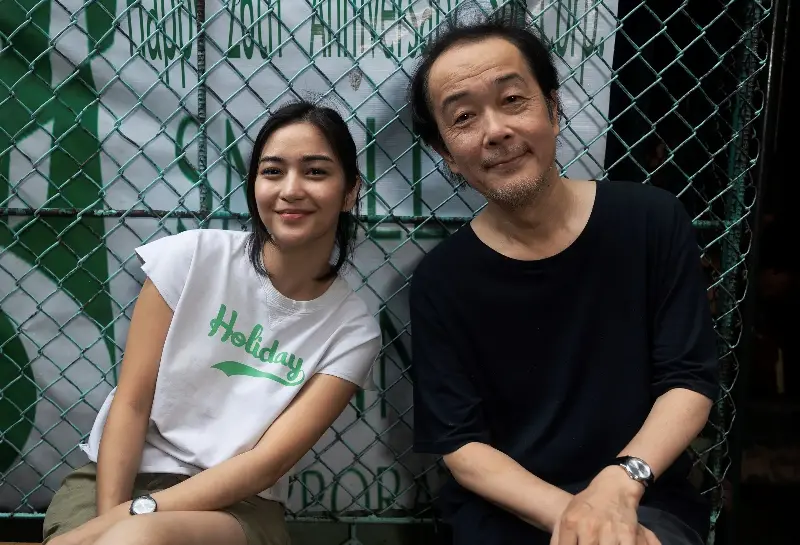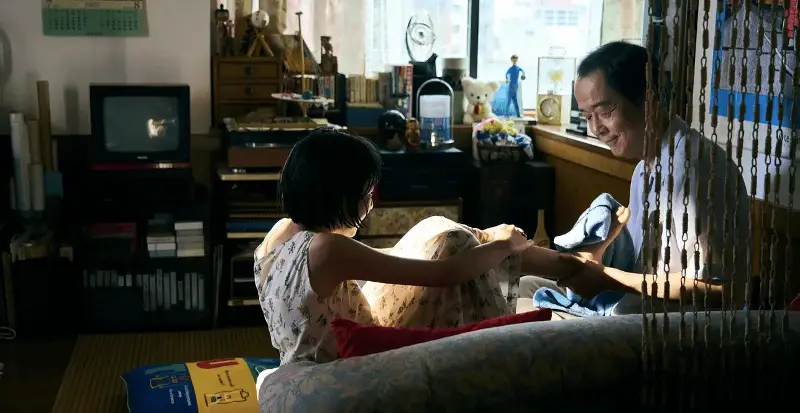
MANILA, Philippines – Two Philippine co-productions that recently screened in-competition at the 2025 QCinema International Film Festival — Janus Victoria’s Diamonds in the Sand and Chie Hayakawa’s Renoir — both star Japanese sensation Lily Franky in compelling roles that serendipitously see him wrestling with death, old age, and loneliness.
In Diamonds in the Sand, which world premiered at last year’s Tokyo Filmex, Japan’s leading independent film festival, Franky plays a divorced and depressed working man in a story that confronts Japan’s lonely death phenomenon, better known as “kodokushi.”
In Renoir, a Cannes 2025 title, he plays a hospital-bound father, who is dealing with terminal cancer, to a quirky young girl (played by newcomer Yui Suzuki) in the summer of 1980s Japan.
Both pictures, which marked Victoria’s directorial debut and Hayakawa’s return to QCinema after screening her own debut, Plan 75, at the festival three years ago, won big at the Asian Next Wave competition: Diamonds in the Sand took home Best Screenplay for Victoria, while Renoir copped Best Director for Hayakawa and Best Lead Performance for Suzuki.
Best known for his roles in Hirokazu Kore-eda’s films, including the Cannes-winning titles Shoplifters (2018) and Like Father, Like Son (2013), Franky readily resonates with his characters, especially Yoji in Diamonds in the Sand, as he also lives on his own.
“Yoji is not a really bad guy nor is he a really good guy. He’s a really ordinary guy. And ordinary guys don’t really become main characters,” the actor said in a group interview, where he was accompanied by an English interpreter.
“But ordinary people usually have something that’s not likable about them,” he continued. “For example, they can be very discriminatory or they can always think that they can be too righteous. So I think the interesting and also difficult part of playing Yoji is how to express the unlikable parts of a very ordinary person.”
In the film, Yoji wrestles with his solitary life after his upstairs neighbor, who also lives alone, ends up dead. Later on, he follows his mother’s caregiver (played by Maria Isabel Lopez) to Manila, an environment famous for its hospitality, where he is made to believe that nobody leads lonely lives.
Franky, though, reckons otherwise. “Since I know a lot of Filipino people closely, I don’t really think that there’s no such thing as loneliness in the Philippines,” he said. “Actually, a lot of my Filipino friends are more on the darker side. And that makes it easier for me to communicate with them. But I think the Filipino people in Japan are probably more lonely than the Filipinos who are in the Philippines because the Filipinos in the Philippines talk a lot.”
“Everyone says that living alone is better or more fun, but I don’t think that’s actually the case,” he added.

New filmmaking trends
Diamonds in the Sand and Renoir both find Franky working with Filipino actors and crew, allowing him to observe the growth of the local film industry.
“Having joined QCinema for the first time and through our shootings with the Filipino staff, I felt that the [Philippine] film industry would be playing a very vital role in the future,” he told Rappler.
“For Renoir, they have investors from the Philippines, Japan, France, and the UAE, so four countries,” continued Franky. “I think the more artistic the film is, the more the tendency to have several investors from several countries, or not to do it as a singular country. So I think that this will probably become the norm of the future. And that is probably better for the promotions of the film.”
The actor added, “Even if there’s only Filipino actors in a film, if they would allow investors or producers from countries to join in the film, I think it helped in the development of the film and also made it easier for viewers from other countries or different countries to have access to the film.”
As someone who has been acting and made over 40 films since the 2000s, Franky said that the biggest shift in the moviemaking industry worldwide is the arrival of streaming services.
“A long time ago, people in English-speaking countries probably did not even think of watching films with subtitles,” he shared in a separate sit-down with Asian Movie Pulse following the group interview.
“I think back then — probably the same in the UK, in France, and in the Philippines — only real cinephiles would choose to watch films that you would have to read subtitles for. But the youth right now probably don’t think that that’s a difficult thing anymore. Viewers from various countries have started viewing films from various countries as well.”
Even Franky relies on streaming platforms to watch Filipino films since they’re not usually playing in theaters in Japan. But he’s quick to clarify that he doesn’t view Filipino titles as “foreign films.”
“I think that’s one of the reasons why filmmaking that goes over country boundaries is more common now,” he said. “No matter what the current positions are — some people would say that the film industry is receding — I think it’s really hard to imagine a life without seeing any films.”
The similarities between Japan and the Philippines also extend to “not-so-good” filmmaking practices. “I think it’s quite similar to the Japanese style,” Franky noted during the group interview. “For example, in Korea or Europe, you can only shoot for a certain number of hours. But both in Japan and the Philippines, you can keep on shooting as long as you want.”
“Even though they have those commonalities, what’s better in the Philippines is that even if you end the shooting at around 3 am, there are still a lot of restaurants or places where you can eat and drink after.”
“I have fun every time I come to the Philippines,” he told Asian Movie Pulse. “The Filipinos are very serious in their craft.” — Rappler.com
